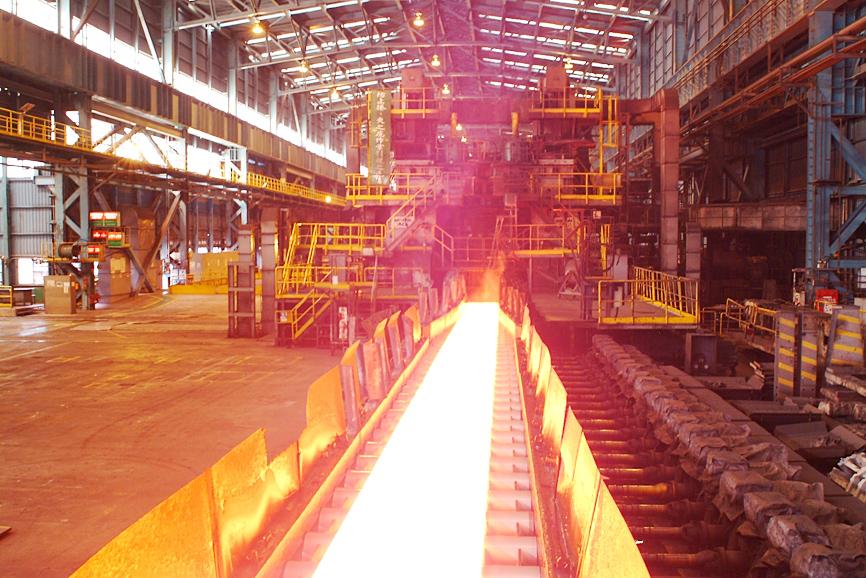China Steel Corp (CSC, 中鋼), the nation’s largest steelmaker, yesterday said it would raise domestic prices by 1.2 percent to reflect higher manufacturing costs and rising steel demand after a two-month price freeze. The revised prices take effect next month.
During the COVID-19 pandemic, CSC raised steel prices straight for 12 months before freezing them last month, citing concerns for downstream companies, and advising them to use the price freeze to adjust their business needs and “prepare for changes that are to come.”
There has been a “short and healthy correction” to Asian steel prices, but the company anticipates a return to steel’s bull run.

Photo courtesy of China Steel Corp
The global steel market is expected to tighten ahead of the traditional “high season” of September and October, the company said.
The continued strength of Taiwanese exports and US and European infrastructure projects present other factors in boosting steel demand, it said.
“We anticipate that the basic infrastructure needs of the US and the EU should create global economic growth, raising demand for steel products,” it said.
“Considering the steady but strong overall direction of the steel market and the higher cost of ore and coking coal, we have adjusted the price for domestic delivery up by 1.2 percent in November,” it said.
Another factor that led the company to anticipate a rebound in international steel is the creation of new Chinese regulations set to meet their carbon neutrality goals.
“The Chinese government has mandated a reduction of crude steel for the second half of 2021 by 60 million tonnes,” the company said. “At the same time, they have raised export tariffs for chromite and high-purity pig iron to 40 percent and 20 percent respectively.”
The prices of hot-rolled steel plates and coils, cold-rolled and electroplated steel coils, and other steel products with monthly determined prices are to go up by NT$500 per tonne. Mid-quality electroplated steel coils will go up by NT$300 per tonne.
Steel products whose prices are adjusted on a quarterly basis will remain the same until the next meeting of the CSC pricing committee, which would meet next month and also discuss steel pricing that would take effect later in the year.

Taiwan Semiconductor Manufacturing Co (TSMC, 台積電) secured a record 70.2 percent share of the global foundry business in the second quarter, up from 67.6 percent the previous quarter, and continued widening its lead over second-placed Samsung Electronics Co, TrendForce Corp (集邦科技) said on Monday. TSMC posted US$30.24 billion in sales in the April-to-June period, up 18.5 percent from the previous quarter, driven by major smartphone customers entering their ramp-up cycle and robust demand for artificial intelligence chips, laptops and PCs, which boosted wafer shipments and average selling prices, TrendForce said in a report. Samsung’s sales also grew in the second quarter, up

On Tuesday, US President Donald Trump weighed in on a pressing national issue: The rebranding of a restaurant chain. Last week, Cracker Barrel, a Tennessee company whose nationwide locations lean heavily on a cozy, old-timey aesthetic — “rocking chairs on the porch, a warm fire in the hearth, peg games on the table” — announced it was updating its logo. Uncle Herschel, the man who once appeared next to the letters with a barrel, was gone. It sparked ire on the right, with Donald Trump Jr leading a charge against the rebranding: “WTF is wrong with Cracker Barrel?!” Later, Trump Sr weighed

LIMITED IMPACT: Investor confidence was likely sustained by its relatively small exposure to the Chinese market, as only less advanced chips are made in Nanjing Taiwan Semiconductor Manufacturing Co (TSMC, 台積電) saw its stock price close steady yesterday in a sign that the loss of the validated end user (VEU) status for its Nanjing, China, fab should have a mild impact on the world’s biggest contract chipmaker financially and technologically. Media reports about the waiver loss sent TSMC down 1.29 percent during the early trading session yesterday, but the stock soon regained strength and ended at NT$1,160, unchanged from Tuesday. Investors’ confidence in TSMC was likely built on its relatively small exposure to the Chinese market, as Chinese customers contributed about 9 percent to TSMC’s revenue last

LOOPHOLES: The move is to end a break that was aiding foreign producers without any similar benefit for US manufacturers, the US Department of Commerce said US President Donald Trump’s administration would make it harder for Samsung Electronics Co and SK Hynix Inc to ship critical equipment to their chipmaking operations in China, dealing a potential blow to the companies’ production in the world’s largest semiconductor market. The US Department of Commerce in a notice published on Friday said that it was revoking waivers for Samsung and SK Hynix to use US technologies in their Chinese operations. The companies had been operating in China under regulations that allow them to import chipmaking equipment without applying for a new license each time. The move would revise what is known